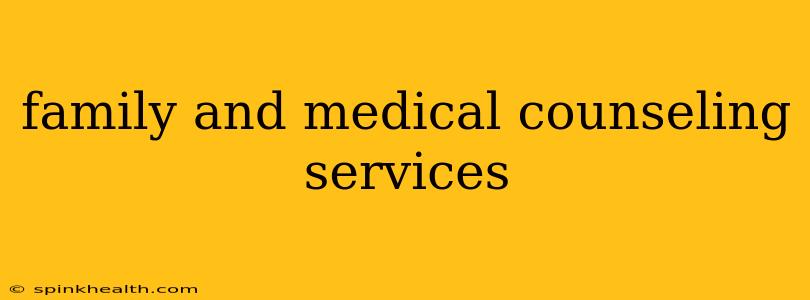Life throws curveballs. Sometimes, those curveballs leave us feeling overwhelmed, lost, and unsure of how to proceed. This is where family and medical counseling services step in, offering a lifeline and guiding hand through some of life's most challenging moments. Whether it's navigating the complexities of family dynamics, coping with a chronic illness, or simply needing someone to talk to, these services provide a safe and supportive space to process emotions and develop strategies for a brighter future.
Let's delve deeper into the world of family and medical counseling, exploring the diverse services offered and how they can benefit you and your loved ones.
What are Family and Medical Counseling Services?
Family and medical counseling services encompass a broad range of therapeutic approaches designed to address various emotional, behavioral, and relational issues affecting individuals, families, and couples. These services often integrate medical considerations, particularly when dealing with illness or disability, recognizing the profound impact of health on mental well-being. Imagine it like this: a skilled navigator guiding you through the sometimes turbulent waters of life, helping you steer clear of potential pitfalls and reach your desired destination.
What types of issues are addressed by family counseling?
Family counseling addresses a wide spectrum of challenges impacting family relationships. From navigating the complexities of blended families to resolving sibling rivalries and managing conflict, therapists help families improve communication, build stronger bonds, and develop healthier coping mechanisms. Common issues addressed include:
- Communication breakdown: Learning effective communication skills is key to resolving conflicts and building stronger relationships. Therapists teach techniques for active listening, expressing needs clearly, and resolving disagreements respectfully.
- Conflict resolution: Families often struggle with conflict. Counseling helps families understand the root causes of conflict, learn healthy conflict resolution skills, and develop strategies for managing disagreements constructively.
- Parenting challenges: Raising children can be incredibly rewarding, but also incredibly challenging. Therapists provide guidance and support to parents struggling with behavioral issues, discipline strategies, or other parenting-related concerns.
- Blended family dynamics: Blending families requires significant adjustment. Therapists help navigate the complexities of step-parenting, sibling relationships, and establishing new family traditions and routines.
- Grief and loss: The death of a loved one can leave families reeling. Counseling provides a safe space to grieve, process emotions, and support each other through the healing process.
What types of issues are addressed by medical counseling?
Medical counseling, often integrated with family counseling, specifically addresses the emotional and psychological impact of illness or disability. This type of counseling tackles the emotional burden associated with:
- Chronic illness: Living with a chronic illness can be emotionally draining. Medical counseling helps individuals and their families cope with the challenges of managing the illness, adjusting to lifestyle changes, and maintaining a sense of hope and well-being.
- Trauma and abuse: Experiences of trauma or abuse can have profound and lasting effects. Medical counseling provides a safe space to process these experiences, develop coping mechanisms, and work towards healing.
- Substance abuse: Addiction impacts not only the individual but also their family and support system. Medical counseling helps individuals and families address the effects of substance abuse, navigate recovery, and build healthier relationships.
- Mental health conditions: Medical counseling addresses various mental health conditions, such as anxiety, depression, and PTSD, providing therapy and support to individuals and their families.
- End-of-life care: Medical counseling can play a crucial role in end-of-life care, providing support and guidance to individuals and families facing terminal illness.
How can I find a family and medical counselor?
Finding the right counselor is a crucial step. You can start by asking your physician for recommendations, contacting your insurance provider for a list of in-network providers, or searching online directories such as Psychology Today or the American Psychological Association. Remember, the therapeutic relationship is key, so find a counselor with whom you feel comfortable and who you believe understands your needs.
What are the benefits of family and medical counseling?
The benefits are numerous and far-reaching. Counseling can:
- Improve communication and relationships.
- Enhance coping skills and resilience.
- Reduce stress and anxiety.
- Improve mental and emotional well-being.
- Promote healing and recovery.
- Strengthen family bonds.
- Provide a safe and supportive environment.
Is family and medical counseling right for me?
If you're struggling with relationship issues, coping with a medical condition, or simply feeling overwhelmed, family and medical counseling may be a valuable resource. It's an investment in your well-being and the well-being of your family. Don't hesitate to reach out for help; seeking support is a sign of strength, not weakness. Taking that first step towards healing can open doors to a happier, healthier, and more fulfilling life.

